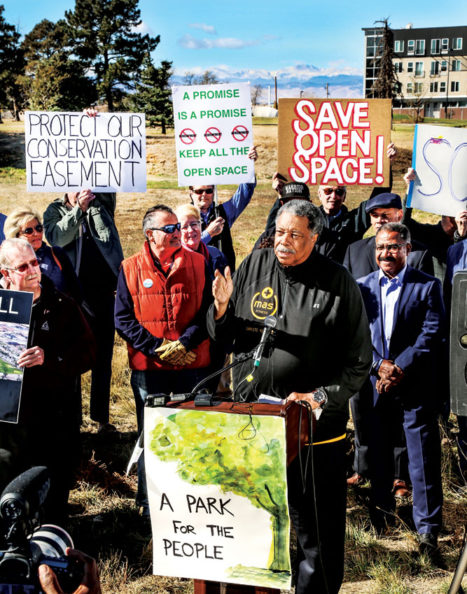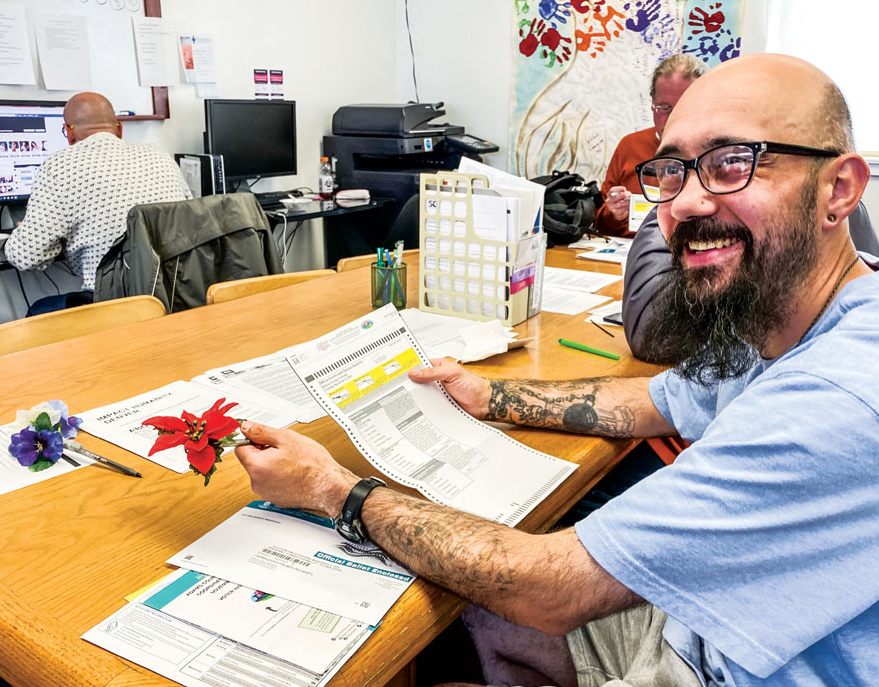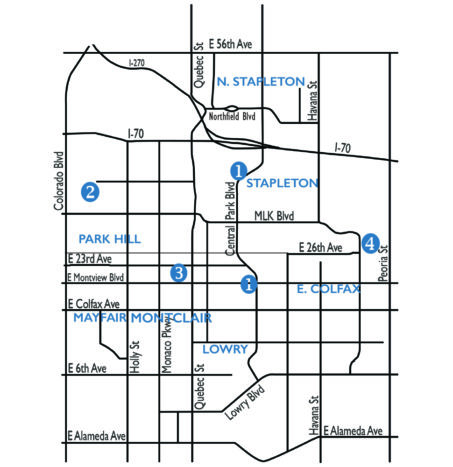1) High Comfort Bike Lanes To Be Built on CPB and City Park Esplanade in 2020
Community input helped shape the design of the new high-comfort bike lane that will be constructed along Central Park Blvd. (CPB), between Montview and 36th Ave. in 2020. Input from participants at a May public meeting as well as public comment at the project website conveyed the importance to planners of several design features. “We’ve done a lot of work to shorten the crossing and made some big improvements at CPB and Martin Luther King, and we’re pretty excited about that,” says Dana Hoffman, Project Manager with the Transportation Design team for the City and County of Denver. “Shortening the crossing makes it easier for people to get out of the conflict zone with vehicles.”

Graphic shows some of the features of the high comfort bike lane coming to Central Park Blvd. in 2020.
A physical barrier will also be part of the final bike lane’s design. “They [the public] wanted more of a clear vertical separation, so we settled on curb stops, which provide additional vertical protection,” says Hoffman. “They also asked for additional pedestrian crossing treatments; we are adding intersection treatments whether at the crosswalk itself or warning signage as well as changing the angle of the turn at certain places to slow down vehicles,” she says. The new high-comfort bike lane should be completed by early fall 2020.
A Nov. 21 meeting was the last public meeting for this project, and Hoffman anticipates that the final design will be available at the project website in early 2020. The Park Esplanade High Comfort Bikeway Project, connecting 16th and 17th Avenues will be the subject of a public open house on Dec. 4, from 5:30-7:00pm, at Denver East High School Cafeteria, 1600 City Park Esplanade, Denver. denvergov.org/bikeprogram
2) The Future of the Park Hill Golf Course? Views Vary Widely

Former Denver Mayor Wellington Webb speaks at a Save Open Space press conference at the Park Hill Golf Course on Oct. 22
“At this point in time, there is no legitimate reason for anybody to initiate a city planning process for some sort of planning on this property while this conservation easement encumbers the land. That would be a terrible waste of citizen resources and city resources,” said Woody Garnsey at a press conference by the advocacy group Save Open Space (SOS) on Oct. 22.
Meanwhile, the mayor and at least two city council members see it differently. “It’s important we ensure there is a robust community engagement process and that neighbors are welcomed and encouraged to participate,” says Councilman Chris Herndon. Councilwoman Robin Kneich says, “I believe it is critical for the city to lead the conversation about the future of the golf course, ensuring that all voices are heard….I hope the community will engage respectfully and thoughtfully in such a dialogue and that it can begin soon.”
The 155 acres of golf course land were purchased by Westside Investment Partners in July. In November the City paid Westside $6 million, allowing the city to permanently use 25 acres of golf course land for stormwater detention and settling a lawsuit over a lease on the property. That agreement also kept in place the golf course use restriction (conservation easement) giving the City and Westside a period of at least three years to listen to community input on future use of the land.
Views differ not only on whether that discussion should happen at all, they also differ on whether it’s legally possible for the land to be used for anything besides a golf course. SOS believes a statute passed by the state legislature on June 30 makes future development on the land impossible. The City believes legal pathways (listed at the end of this article) may exist that would make development possible.
Whether to keep the land as a golf course or use it in other ways will be worked out in community discussions over the next three years.
Mayor Webb, who initiated the conservation easement during his tenure as mayor, argued in a recent Denver Post editorial: “Protecting and increasing Denver’s open space against the effects of climate change, such as desertification, flooding and the heat island effect, has never been more critical…” In the October 22 press conference, Webb said, “…we need to fight to make sure this doesn’t turn into a commercial-mixed use development that has poor architecture, people being displaced…”
Kenneth Ho of Westside has a background in urban planning as well real estate development and has served on the Mayor’s Housing Advisory Committee and on the Planning Board. He says, “…parks also have the power to increase property values surrounding it and therefore can cause gentrification. With that, affordable housing absolutely needs to be part of the program here. Since the land doesn’t have any residents on it, we won’t be displacing anybody directly…”
Webb says: “If a concrete residential-commercial development is put here, you can never reclaim this space. It’s gone.”
Ho says: “…we don’t think a golf course achieves any of the outcomes around equity, access and sustainability that are part of the city’s current comprehensive plan ….We can either address the area’s need for a significant amount of park space, affordable housing, neighborhood services and job creation with a mixed use development, or we can address one thing, which is a golf course. We think we can address more than one issue facing the city.”
Webb says: “…there is no one [in the City] saying no on [development] permits being offered, to say we’re going to have higher standards.”
Ho says: “We know that we’re going to have a number of agreements with the community and the city and we want to make sure it’s balanced and addresses some of the mistakes that were made in the past…you’re definitely seeing it in terms of entitlement processes (what’s required to get approvals and permits) and the need to address affordable housing and open space in a meaningful way.”
The November agreement between Westside and the City created time for the community to speak on the future use of the golf course land—and clearly the discussion has started. After three years of public input, if City Council does not approve a plan for use other than as a golf course, the conservation easement will stand and Westside will be responsible for restoring and rebuilding this land as a golf course.
For interested readers, Denver City Attorney Kristin Bronson gives the following legal reasons why the City believes future development may be possible despite the conservation easement (acknowledging these would need to be vetted further): 1) The conservation easement has been part of the chain of title of the property for over 20 years and preceded the current version of the law. 2) One purpose of the statute is to prevent improper use of tax credits associated with conservation easements, which doesn’t apply since there were no tax credits; and, in particular, would the statute apply to an easement held for over 20 years by a home-rule municipality? 3) If the community decided and city council approved a change, the City could, depending on the change, ask the court to decide whether the statute would apply to or permit the new uses. The statute doesn’t address modifications, it just addresses terminations; and the physical condition of the property over the history of the easement would need to be evaluated. 4) With regard to matters of local land use control, courts are highly deferential to decisions made at the local level.
3) Illegal Pete’s Comes to NE
With the arrival of Illegal Pete’s to Oneida Park in Park Hill this spring, it will get even harder to park on the already crowded block—maybe consider riding your bike. The fast casual restaurant will bring with them a long list of “Best of” awards ranging from best burrito, best vegetarian green chile, best fish and other tacos, best breakfast burritos, and best late night food. Other recognitions include a plaque for working around the clock to feed police officers working the 2011 Aurora shooting and Inc. 5000’s Fastest Growing Companies in the U.S. in 2016 and 2019.
Those familiar with Illegal Pete’s may associate them with a college crowd—and their locations in Boulder (where Pete Turner opened his first restaurant in 1995), Ft. Collins, and DU do bring in the students; but Erin Barnes from Illegal Pete’s says the character of their 11 current restaurants reflects the surrounding neighborhoods. “We’re definitely keeping in mind that Park Hill has it’s own personality.” Although the restaurant will have a full bar, they expect and welcome families.
Illegal Pete’s also is known for its Living Wage Initiative. “It’s really important to Pete that people who work in the restaurant industry can actually consider their job a career. He was seeing some of his employees having to work two jobs to make ends meet,” says Barnes.
“It doesn’t matter if you’re on a gluten free diet or vegetarian or vegan, we design our menu so that whoever is coming in to Illegal Pete’s can rest assured, if you have allergies, that you’re not going to have a bad experience. We have everything outlined on cards so people can see what has gluten or dairy. You can see our fresh ingredients and design it how you like,” says Barnes. She points out that their beef and pork are sustainably raised and obtained from Niman Ranch, who she calls “beacons in animal husbandry.” Pete’s opens for breakfast with $5 burritos and bowls and is also known as a great late night spot, though exact hours for Park Hill aren’t yet available.
4) MLK to Peoria Opening Date
The original CDOT contract specifies completion in March 2020, according to the contractor, Mortenson Construction. At this time the goal is for traffic to access the new road from Iola to Peoria by the end of 2019. This would include removing detours through the neighborhoods, but not operating on a full 4-lane road.
Final road work and landscaping will be done in early 2020 and will include periodic detours and traffic control.
An “Election First” for Colorado

Voting for the first time in the recent November election, Brad Simpson contemplates the Denver ballot at Aurora’s Second Chance Center (SCC). Simpson, who cast his vote about two weeks after his release from prison, served 20 years. He is among the first formerly incarcerated individuals to be allowed to vote immediately upon their parole in Colorado. The state changed its laws earlier this year, restoring voting rights to parolees. Not voting wasn’t an option for Simpson, who says, “That would seem irresponsible of me. One thing I’m trying to learn how to do is be more responsible.” SCC helps formerly incarcerated individuals transition into society.




Is there any word as to when the sidewalks along MLK to Peoria will be open? Getting to the train station is a nightmare right now and it seems like it would be easy for them to pour the sidewalks now.